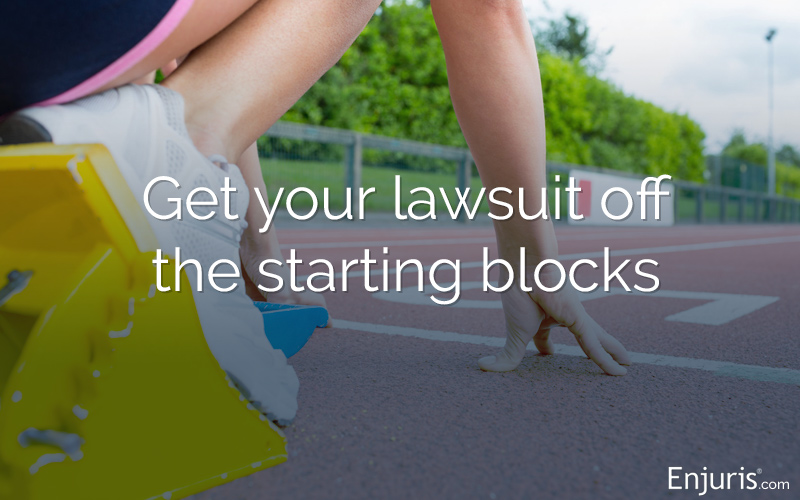Find out the steps you need to take to get your civil suit started
If you suffer physical, mental and/or financial harm because of someone else’s actions or inactions, you may be able to file a personal injury lawsuit to recover damages.
In this article, we’ll walk you through the steps you need to take to file your personal injury lawsuit in South Carolina.
Step 1: Make sure you have legal standing
Before you file a personal injury lawsuit, you need to have legal standing. If you don’t have legal standing, your lawsuit will be dismissed.
In South Carolina, you need to establish 4 things to have legal standing:
- Legal capacity. Children under age 18 and adults who are mentally incompetent don’t have the legal capacity to file a lawsuit. In both cases, certain people who have legal capacity (such as guardians) can file lawsuits on their behalf.
- Actual harm. To file a personal injury lawsuit, you must have suffered actual harm. In other words, you can’t file a personal injury lawsuit because you think you might suffer harm in the future (though there are other legal actions you may be able to take, such as applying for a restraining order).
- The defendant could have caused your injury. You don’t need to prove that the defendant caused your harm at the outset of your lawsuit (that’s what litigation is for). But you do need to have enough information in your complaint to establish that the defendant reasonably could have caused your harm.
- Adequate relief. The court must be able to provide relief that would help remedy the harm you suffered.
Step 2: Hire a lawyer or prepare to represent your case
There’s no legal requirement that you have to hire an attorney to file your personal injury lawsuit.
In small claims court, most parties are not represented by lawyers. On the other hand, the vast majority of parties are represented in all other courts.
If you decide to hire an attorney, it’s a good idea to meet with several attorneys to ensure that you hire the right attorney. Here are some resources to help you:
- Enjuris Lawyer Directory
- How to choose a personal injury attorney - questions to ask
- Preparing to meet with a personal injury attorney
- Negotiating attorney fees
Step 3: Determine where to file your lawsuit
In South Carolina, the vast majority of personal injury lawsuits are filed in circuit court. Circuit courts are courts of general jurisdiction, which means they can hear any kind of lawsuit.
There are 2 main reasons why you might NOT file your lawsuit in circuit court:
- If the damages you’re seeking don’t exceed $7,500, you have the option to file your lawsuit in small claims court. Small claims court is generally less expensive and less formal than circuit court.
- If your lawsuit alleges a violation of the United States Constitution or federal law, you have the option to file your lawsuit in federal court.
There are 16 circuit courts in South Carolina. Each court covers 1 or more counties. In most personal injury lawsuits, you can file your lawsuit:
- In the county where the defendant lives, or
- In the county where the accident occurred.
If you were injured at work, you might file a workers’ compensation claim. A workers’ compensation claim is different from a personal injury lawsuit and would be filed—at least initially—with the South Carolina Workers’ Compensation Commission.
Step 4: File and serve your complaint
To officially start a lawsuit, you need to:
- File a complaint with the proper court and pay the filing fee, and
- Serve the defendant with a copy of the complaint and summons.
If you’ve hired an attorney, you don’t have to worry too much about the complaint and summons, as your lawyer will prepare them. Nevertheless, here is a brief summary:
- Complaint. A complaint is a short and concise statement of the facts giving rise to the lawsuit and the legal justification for the lawsuit.
- Summons. A summons is a legal document that informs the defendant that they’re being sued and provides instructions for responding to the lawsuit.
The complaint and summons must comply with the South Carolina Civil Court Rules and the local rules of the court in which you’re filing your lawsuit.
You can serve your complaint and summons by any means described in Rule 4 of the South Carolina Civil Court Rules. In most cases, this means delivering a copy of the summons and complaint to the defendant in person or delivering a copy to an agent authorized to accept service on the defendant’s behalf.
Failure to properly serve the defendant could result in your case being dismissed.
What’s more, you run the risk of missing the statute of limitations, which means you will be permanently barred from refiling your lawsuit. For these reasons it’s a good idea to let your lawyer take care of service—or, if you’re representing yourself, to hire a reputable process server.
Step 5: Be patient
Once you file and serve your complaint and summons, the defendant has the opportunity to respond. The defendant’s response is called an “answer.” In South Carolina, the defendant generally has 30 days after being served with the complaint to file an answer.
Once the court receives the defendant’s answer, the court will create a scheduling order, which sets forth the important litigation steps and deadlines.
While you’re waiting for your lawsuit to proceed, there are a couple of things you should do (and not do):
- Preserve any evidence related to your claim. For example, it’s a good idea to take photographs of any damages you sustained. It’s also a good idea to avoid throwing away anything that might be used as evidence to support your claim.
- Don’t post about your accident or lawsuit on social media. Avoid posting anything about your accident or injuries on social media, even if you think it will help your case.
- Be patient. Lawsuits are stressful and can take a long time to resolve. It’s important to be patient and practice self-care during this time.
Ready to get started? Use our free online directory to locate a licensed attorney in your area.
See our guide Choosing a personal injury attorney.


